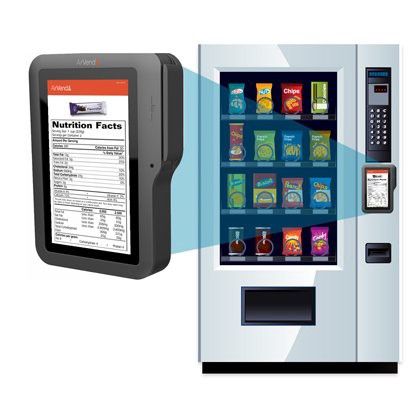We’ve really had a lot of these relationships and a lot of these things building, but the funding allows us to scale and take it to the next level.
The Patient Protection and Affordable Care Act (aka “Obamacare”) was signed into law by President Barack Obama on March 23, 2010. Included in the statute was a little talked-about provision requiring calorie information to be displayed on roughly 5 million vending machines nationwide. According to the Associated Press, the Food and Drug Administration estimates the cost to the vending machine industry at $25.8 million initially and $24 million per year after that.
AirVend, a Provo, Utah-based startup, plans to help lessen the impact this new regulation will have on vending machine companies. The company recently raised $1.2 million in a Series Seed round of funding to fuel its production of vending-machine-mounted, cashless touchscreen devices designed to help vending operators prepare for the impending Obamacare requirement. The touch screen technology company was founded in April, 2012 by Chad Francis, David Loveland, and Lance Ellsworth.
When asked about the new law and the purpose of AirVend’s touchscreen technology, CEO and founder Chad Francis answered, “We love the idea of consumers having nutrition info available, but we also don’t want the new calorie disclosure requirements to break the back of the average vending operator. We are extremely excited to be able to raise the funds in order to take our company and vending technology to the next level and be part of the overall solution.”
Prior to founding AirVend, Francis was the CEO of a mobile enterprise software development company located in Provo.
AirVend was conceived after a client approached Francis, wondering if he could build an Android-based POS (point of sale) system for vending machines. The typical arrangement a client can expect when hiring an outside software development firm is to pay a certain amount of money in exchange for a product the client would then own once development has been completed. However, this deal was a little bit different.
“They said, ‘What if we just bought the product from you for all of our featured customers and we didn’t pay you anything up front?’” said AirVend’s Chief Revenue Officer, Lance Ellsworth.
As Francis and his team considered their client’s offer, they evaluated the market and came to realize the vending space was a multi-billion dollar industry completely lacking in innovation and technology. The whole market was full of inefficiencies, which made it ripe for disruption.
They initially raised a small amount of seed money in April, 2012 to build a protoype of the product. By November of that same year, they were able to ship around 200 units. Last year, as they continued to ship their product to customers, they were able to refine the software and now believe it’s baked and ready to go. The hardware is still in the prototype phase of development, as they continue to get feedback from customers.
That’s where this recent round of funding comes into play.
“The future is deploying Version 2.0 of the hardware and scaling it out. We also plan to take advantage of the relationships we’ve already structured,” said Ellsworth.
In the next couple of weeks, AirVend hopes to announce a partnership with the largest card reader in the industry. The company will be reselling AirVend’s hardware to their customers.
AirVend’s most recent Series Seed round involved two outside parties. The first group is 365 Retail Markets, a strategic vending industry partner. The second group is PS27 Ventures, an investment firm focused on healthy living and wellness initiatives. PS27 Ventures was previously using a product built by one of AirVend’s competitors, but they decided to invest in AirVend because they believed it was a superior product.
“We’ve really had a lot of these relationships and a lot of these things building, but the funding allows us to scale and take it to the next level,” said Ellsworth.
AirVend’s product currently addresses three major problems facing the vending machine industry.
1. According to Ellsworth, only 4 percent of vending machines currently offer customers a cashless payment method. Vending machine companies that offer customers other payment options usually see a 30–40 percent increase in sales. What’s currently driving AirVend’s growth is the credit card processing they offer.
2. Inventory and sales data. The vast majority of vending machines don’t have the ability to give real-time sales and inventory data. Vending companies currently have someone drive around to each of their machines with a bunch of inventory to restock when necessary. AirVend allows you to access inventory and sales data from your phone or any web-enabled device.
3. Obamacare compliance. As mentioned above, any vending machine company operating 20 or more machines will have to comply with the new regulation.
While the $1.3 million Series Seed round will help AirVend continue to grow, they’re not done yet.
“We’ll raise more,” said Ellsworth. “We’ll do a Series A, probably, in five or six months. It kind of really depends, but most likely, to scale, we’ll need to do it.”
You can expect to hear a lot more about AirVend in the future.
“We’re in the very beginning phase,” said Ellsworth, “but so far things look good.”
Published 1/6/2014





